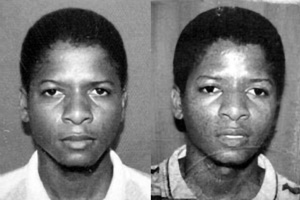
FBI/Zumapress.com
Today is a day that many Americans thought would never arrive: At 9:30 a.m., in the courtroom of Judge Lewis Kaplan of the Southern District of New York, the first-ever trial of a Guantanamo detainee in a federal court is scheduled to begin. It is the case civil libertarians like me have been waiting for, the first real chance to prove that the civilian court system can work in trying Guantanamo terrorists. And yet, on the eve of the trial’s opening, many of us are still wondering what the rules of the game will be—and even whether this was such a good idea after all.
(UPDATE: On Wednesday morning, Kaplan barred a major prosecution witness, Hussein Abebe, from testifying because the government, “failed to prove that Abebe’s testimony is sufficiently attenuated from Ghailani’s coerced statements to permit its receipt in evidence.” That decision will delay the trial until next week.)
It’s not, of course, that terrorists aren’t commonly tried in US courts: The federal courthouse in Manhattan, within walking distance from the World Trade Center site, is a veritable cineplex of terrorism cases. In the past few weeks alone, it has been the site of three other high-profile proceedings: Aafia Siddiqui, who had been convicted of taking up arms against officers of the FBI and the Army in Afghanistan, was sentenced to 86 years on September 23rd; Faisal Shahzad, the would-be Times Square bomber, was sentenced to life in prison yesterday; also yesterday, attorneys finished their summation arguments in the case of four men accused of plotting to blow up synagogues in the Bronx.
But the trial scheduled to begin this morning is by far the most important in terms of symbolism—and potential repercussions. It is the case of Ahmed Khalfan Ghailani, and on its outcome rest the prospects for other Guantanamo detainee trials, including that of Khalid Sheikh Mohammed, believed to be the mastermind of 9/11.
Ghailani’s is the perfect test case. The 30-something Tanzanian (no one seems to know precisely how old he is) stands accused of being involved in the attack on the US embassies in Tanzania and Kenya in 1998, bombings that resulted in hundreds of deaths. This is a crime the American judicial system knows how to try. Three of those accused in the embassy bombings were tried and convicted in this same federal court district and are now serving life sentences in a supermax prison in Colorado.
But, ironically, there is another reason that the Ghailani case is a test case for Mohammed and the other “high value detainees” in Guantanamo—those accused of major attacks or of holding high-level positions in the Al Qaeda network. Ghailani, like Mohammed, Ramzi bin al-Shibh, and others, was subjected to enhanced interrogation techniques, more commonly known as torture. Presumably, if it proves possible nonetheless to try his case in civilian courts, the same would be true for Mohammed and others.
Moving Ghailani to New York was a brave choice for the Obama administration, however unnoticed it went by the press and the public when it happened back in January. In fact, even now only a handful of reporters are in attendance at the hearings—a startling absence, since what’s on trial here so far is not so much Ghailani as the issue of torture itself.
For nearly a year now, the defense has presented challenges to the prosecution based on the fact of torture. It has made the case that torture at the hands of the CIA violated Ghailani’s constitutional rights and was grounds for the case to be dismissed. The judge, likely feeling the weight of the entire judicial system on his shoulders, said the case could proceed—torture was a matter for another court. For civil libertarians like me, who have been fighting the torture policy and also been arguing for civilian trials for terrorists, it was an intellectually and morally challenging decision: Can we make our peace with a ruling that validates the civilian system, but at the cost of allowing a torture victim to appear in court?
Apparently so. And Judge Kaplan has made things a bit easier with his decision that statements made by Ghailani, either under enhanced interrogation or by “clean teams,” will not be used by the prosecution to build their case. But this is by no means the end of the impact torture is having on this trial.
Last week, Ghailani, cleanly shaven, wearing a baby-blue V-neck sweater, a white collared shirt and a pencil thin black tie, turned somewhat shyly to face a room full of potential jurors. Moments later, the judge informed the jury pool that whether or not Ghailani appeared in the courtroom during the trial should not affect their judgment about guilt or innocence. What the judge did not tell the jurors was that torture was the reason. Ghailani has refused to come to court through most of the pre-trial hearings and has asked not to have to be in court for the trial on the grounds that his enhanced interrogation—and what came afterwards—has given him post-traumatic stress syndrome, a condition that he argues is exacerbated by the strip search required on the way into and out of court each day.
And there is more. This trial was supposed to begin on Monday but was delayed until today over the matter of the prosecution’s main witness. Last month, the government brought to the court a prospective witness from Tanzania who could allegedly tie Ghailani to the explosives used in the attack on the embassy there. The problem is that the government may have located Abebe only because of information it gleaned by torturing Ghailani. Allowing the trial to take place, despite torture, is one thing. Allowing evidence that is the result of the defendant’s torture to be allowed into the proceedings is quite another. The judge has yet to rule on that question.
As the curtain rises on this case—which I will be covering day by day—perhaps the most interesting question is whether the torture issue can truly be put on the back burner to allow the terrorism charge to come to the fore. At what cost are we trying these cases in civilian courts? We don’t really have a choice—there are no functioning military commissions to speak of, and indefinite detention is not an option for a nation bound to the concept of due process. But as the Ghailani trial makes clear, the real fruit of the poisoned tree is not just tainted evidence, but a stain on the rule of law itself.












